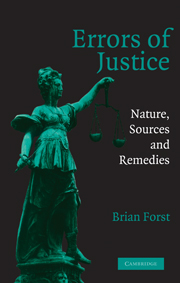Book contents
- Frontmatter
- Contents
- Preface
- Acknowledgments
- 1 The Problem
- 2 Errors of Due Process
- 3 Errors of Impunity
- 4 Frameworks for Analyzing the Incidence of Justice Errors
- 5 Assessing the Cost of Justice Errors
- 6 Standards of Evidence
- 7 Police-Induced Errors
- 8 Prosecution Policy and Justice Errors
- 9 The Jury
- 10 Sentencing and Corrections
- 11 Homicide
- 12 A Matter of Legitimacy
- Bibliography
- Index
- Titles in the series
6 - Standards of Evidence
Published online by Cambridge University Press: 05 July 2011
- Frontmatter
- Contents
- Preface
- Acknowledgments
- 1 The Problem
- 2 Errors of Due Process
- 3 Errors of Impunity
- 4 Frameworks for Analyzing the Incidence of Justice Errors
- 5 Assessing the Cost of Justice Errors
- 6 Standards of Evidence
- 7 Police-Induced Errors
- 8 Prosecution Policy and Justice Errors
- 9 The Jury
- 10 Sentencing and Corrections
- 11 Homicide
- 12 A Matter of Legitimacy
- Bibliography
- Index
- Titles in the series
Summary
Proof beyond a reasonable doubt is proof that leaves you firmly convinced of the defendant's guilt. There are very few things in this world that we know with absolute certainty, and in criminal cases the law does not require proof that overcomes every possible doubt. If, based on your consideration of the evidence, you are firmly convinced that the defendant is guilty of the crime or crimes charged, you must find him guilty. If, on the other hand, you think there is a real possibility that he is not guilty, you must give him the benefit of the doubt and find him not guilty.
— 133 Sample Jury Instructions [18 U.S.C. §§ 241 (1997)]Introduction
Our criminal courts work to achieve justice by establishing guilt and, for defendants found guilty, sanctioning them in accordance with the law. Establishing guilt involves a fact-finding process that aims to determine whether the evidence is sufficient to prove beyond a reasonable doubt that the defendant is guilty of the crime charged. This rule is actually invoked only for the relatively few cases that go to trial — some 85 to 90 percent of all felony convictions are by plea — but the interpretation of the rule by juries and judges (not all trials use juries, and judges may influence the jury's interpretation in those that do) lies at the heart of the problem of finding a balance between the error of convicting an innocent person and that of failing to convict a true offender.
- Type
- Chapter
- Information
- Errors of JusticeNature, Sources and Remedies, pp. 57 - 65Publisher: Cambridge University PressPrint publication year: 2003

